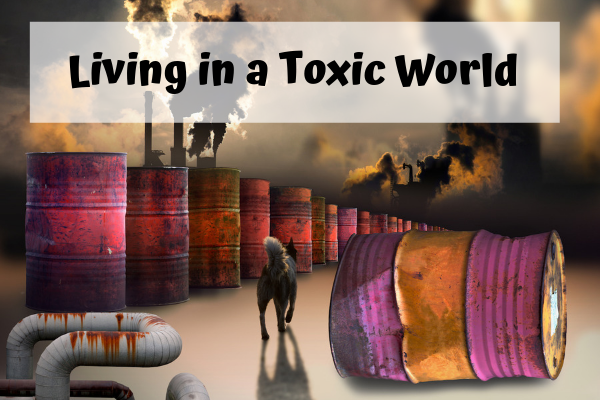
Something often overlooked is our exposure to toxins and that the accumulation of toxins in our bodies can be the cause for many of our health issues. There is no doubt about it, we live in a toxic world.
Living in a Toxic World
Toxins are everywhere. Toxins are in the food we eat, the water we drink, and the air we breathe. Pets are exposed to the same toxins and have to deal with toxins just like humans do.
While the human body as well as the pet’s body has an innate capacity to detoxify, it cannot cope with the elevated levels of toxins we are exposed to in today’s modern world. Most alarmingly, this toxic overload has helped transform once rare diseases into epidemics affecting people and pets of all ages.
In addition, a variety of other factors related to our stressful modern life and a lack of wholesome natural nutrition have increased demands put on our bodies and our pets’ bodies. As a result, toxin accumulation can occur, which can manifest in numerous ways in dogs, such as digestive, allergic and neurological symptoms. First signs of trouble often seem to show up first on the skin.
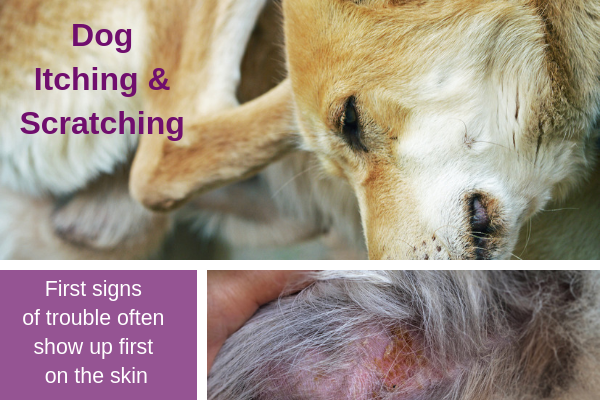
The problem with toxicity is very real and shouldn’t be underestimated! Detoxifying your dog is truly necessary and the key to better health and avoiding disease.
Environmental Toxins
Environmental toxins are everywhere and we cannot avoid them. With the advancements of science and industrialization, many foreign and toxic chemicals are being produced and released into our living environment. For example, leftovers from plastic manufacturing such as dioxins and PCBs are some of the most potent triggers of cancer ever known to man.
Numerous research studies have demonstrated that these toxic chemicals can interfere with our body’s biochemistry and health.
Toxins in our Food
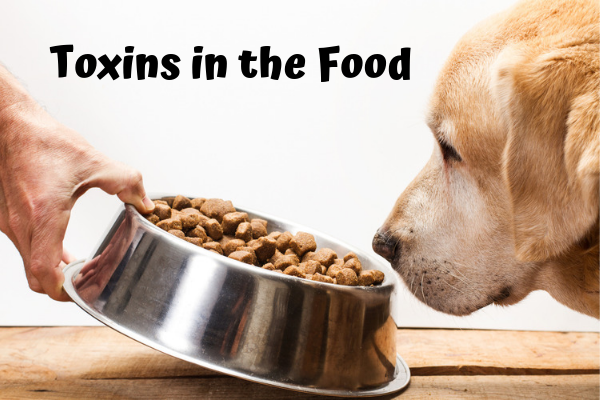
Just about everything we buy is either wrapped in plastic, or comes in a plastic bag, a plastic bottle or a plastic cup. Anything from fruits, vegetables, meat at the grocery store, to the coffee from the coffee shop, and of course, pet food. The phthalates that outgas from these plastics leach into our foods.
Once inside our bodies, the phthalates or plasticizers hook onto our cells and do damage, or they accumulate in our organs and can trigger allergies, cancers, and auto-immune diseases like thyroiditis, arthritis, diabetes, colitis, and more.
But those are not the only toxins in pet foods. There are chemical preservatives, artificial colors and flavors. Dangerous heavy metals like arsenic, lead, cadmium and mercury as well as BPA, pesticides and other toxins have been found in popular commercial pet foods.
Toxins in our Water
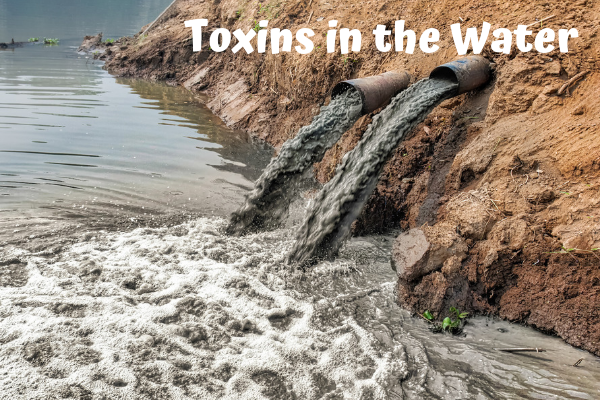
Water quality is a subject that is often in the news. Industrial dumping, pesticide runoff, leaky storage tanks, and government mandates have created big water quality problems. Lead can find its way into our water through corroded pipes, mercury though byproducts of mining and industrial practices, and arsenic as a result of improper waste disposal. There are hundreds of toxins that can be present in our water.
On top of that, man has figured out many more ways how to increase the toxicity of drinking water by adding chemicals like Fluoride and Chlorine to the water in many areas.
Toxins in the Air we Breathe
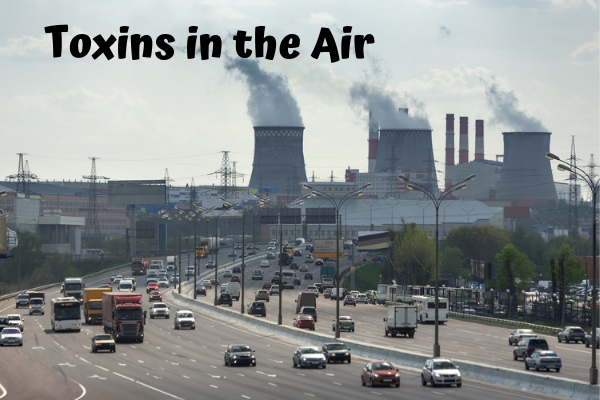
Plastics or phthalates not only get into our foods, but they are also in the air we breathe every day. There is not a home, office or institution where plastics cannot be found. They are used in construction materials, building products, furnishings, carpet, mattresses and much more.
They can be found in dog toys, dog beds, car seats, and bowls your dogs eat and drink out of, just to give a few examples. But plastics are also just one example of thousands of everyday chemicals we get exposed to, as well as our dogs. There is auto exhaust and the exhaust from industry. Outdoor air definitely contains some of the nastiest concoctions of pollutants.
Many pet parents keep popular cleaning products around the house and may not realize those are not safe for their dogs. According to an article on Dogster, several studies have been done on the dangerous effects of some common cleaning products.
Many of these products included data on pets which showed they are not immune to chemicals and that many cleaning products are not pet safe. Three cleaners, Pledge, Clorox Wipes and Lysol Disinfecting Spray, registered close to a thousand times more vapor pressure than a natural cleaner. This means that even when the toxic cleaners are put away and closed, the vapors left behind can continue to harm both, us and our pets.
What is Detoxification?
Detoxification is a naturally occurring and ongoing process in the body to eliminate chemical toxins.
The liver is the most important organ that runs the detoxifying processes and removes toxins. In addition, the lungs, intestines, kidneys and skin play a big part in detoxifying your dog as well.
Detoxification starts in the liver with a two-step process:
Phase I
In this first phase, lots of enzymes help prepare for phase II of detoxification by preparing fat soluble toxins to be transformed into water-soluble metabolites. All of these enzymes require minerals to make this process work.
This works best when supported with nutrients such as vitamin A and carotenoids, B vitamins and folate, vitamins C and E, calcium, magnesium, zinc and selenium. Antioxidant nutrients also protect against the free radical byproducts of Phase I oxidation reactions.
Phase II
This phase is the metabolic step that the cells use to hook activated, unwanted toxic substances up with small nutrient groups. This “hook up” process effectively neutralizes the toxins and makes them sufficiently water-soluble for excretion in the urine.
One critical “hook up” process during this phase involves glutathione for neutralization and excretion of toxins from the body.
How to Detoxify your Dog
- Lessen the toxic load by eliminating or decreasing environmental toxins as much as possible in the home, food and air.
- Feed a fresh clean diet of nutritious natural foods as much as possible, or add some nutritious whole foods to commercial pet foods.
- Support your dog’s body with nutrients that help support liver health and naturally help with detoxifying your dog on an ongoing basis.
- Consider adding some probiotics and prebiotics to your dog’s food to support the friendly microbes in your dog’s gut.
Detoxification depletes Nutrients
The work of detoxifying uses up and depletes nutrients. For every molecule of a nutrient that hooks onto a chemical to detoxify it, a molecule of that nutrient will be used up, depleted and forever lost. In order for detoxification to work, feeding your dog a healthful, nutrient-rich diet is incredibly important to restore the detoxifiers.
- Dogs that are deficient in nutrients needed for detoxification will not completely detoxify.
- Dogs that are fed predominately commercial pet food, especially kibble, don’t even stand a chance of making enough detoxifiers like glutathione, leaving their bodies extremely vulnerable for the next chemical exposure.
Red Beets – The Ultimate Detoxifier for People & Pets
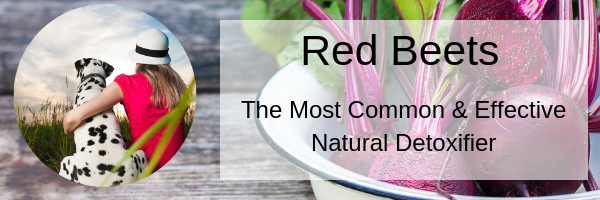
The red beet is one of the most common and effective natural liver detoxifiers. Red Beets have been used to fight liver toxins and to improve the overall health of humans for decades.
You can also utilize the power of red beets for detoxifying your dog and improving your dog’s overall health.
Thankfully, Olewo makes Dehydrated Red Beets for Dogs that are highly digestible and effective, and can be easily integrated into their daily meals for ongoing natural detoxification.
15 Tips for Detoxifying your Dog or “1” Natural All-in-One Solution?
You can truly find some good advice online for detoxifying your dog, but if you take a look, you will see that if you were to follow some of those suggestions, in most cases you would end up with a shopping list for multiple products. Anything from vitamins, antioxidants, liver tonics, herbs, homeopathic remedies and the list goes on.
There is no doubt about it, each of the suggested products would be very beneficial and help with certain parts of detoxification, but none of these products offer an all-in-one solution. In addition to products, you will find that other resources have you add cruciferous vegetables, garlic, and even onions (in small amounts) to your dog’s meals to make detoxification work.
The truth is, we are all looking for convenience, that’s why most dog owners feed kibble in the first place. I also know from my own experience, that when things are too complicated, we’re not getting it done!
Olewo Red Beets for Dogs truly offer an all in one solution. While a dog will definitely benefit from a fresh, natural diet, you can drastically increase the nutritional value of your dog’s meals by adding Olewo Red Beets on a daily basis, no matter what you are feeding.
These red beets prepared especially for dogs provide all the right nutrients to boost the functions of Phase I and Phase II of liver detoxification. At the same time, the powerhouse nutrients in red beets will nourish your dog with every meal to naturally help make and replenish those important detoxifiers in your dog’s body.
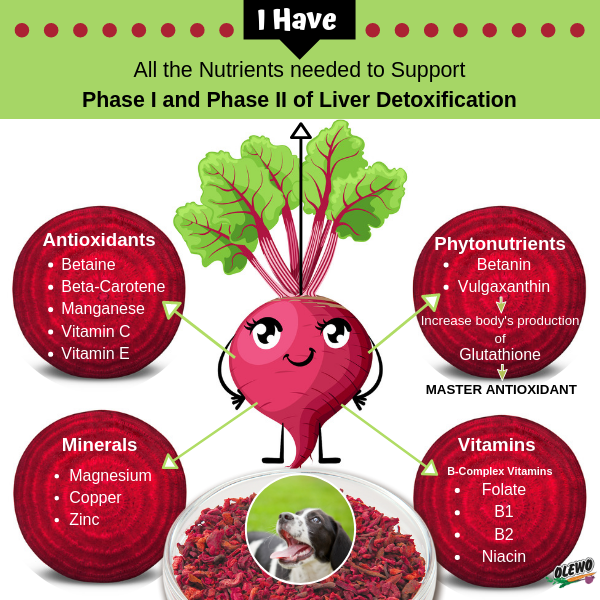
Why Nothing Beats Red Beets
- Red Beets include a variety of vitamins, minerals and antioxidants rarely found in such high concentrations within one food.
- Red Beets are not only rich in antioxidants, but they contain a unique combination of many powerful antioxidants. For that reason, the red beet is recognized as a standout vegetable in the area of antioxidant support.
- But it doesn’t stop there. Many of the betalains in red beets function both as antioxidant and anti-inflammatory molecules providing ultimate Phase II triggering benefits.
- These natural betalain compounds also help promote liver and kidney health, which are the two primary detoxifying organs in the body.
The Fiber Factor
Beet fiber is a nutrient that not only provides many health benefits, but also helps with detoxification. Specifically Pectin, which is a fiber found in beets, can help clean the toxins that have been removed from the liver, allowing them to be flushed out of the system instead of being reabsorbed by the body.
Beet fiber is also an excellent prebiotic, which helps feed healthy probiotic bacteria in your dog’s gut.
Antioxidants
Red Beets contain a unique combination of major antioxidants that help neutralize toxins by supporting the functions of liver detoxification.
- Betaine
- Beta-carotene
- Manganese
- Vitamin C
- Vitamin E
Phytonutrients
Red Beets contain two important phytonutrients that increase the body’s production of
Glutathione – The Master Antioxidant.
- Betanin
- Vulgaxanthin
Glutathione is one of the body’s most important and potent antioxidants and is produced by the body. It is primarily made up of 3 amino acids: glutamine, lysine and cysteine.
It is the body’s master antioxidant. While some nutrients are only able to detoxify certain types of chemicals, glutathione has the ability to hook onto hundreds of types of environmental chemicals and detoxify them. It is the major tool for Phase II of detoxification, and therefore it is incredibly important for the body to have adequate glutathione levels at all times.
You will find that many resources suggest to consume sulfur-rich foods like dietary proteins (beef, fish, poultry) and cruciferous vegetables (broccoli, Brussels sprouts, cauliflower, kale) to boost the body’s production of glutathione.
Red Beets work differently as they contain the phytonutrients betanin and vulgaxanthin that increase the body’s production of glutathione. Pretty amazing how the red beet can do it all!
Minerals
Red Beets contain the important minerals needed to help produce enzymes in Phase I that will be needed in Phase II of detoxification.
- Magnesium
- Copper
- Zinc
Vitamins
Red Beets contain important B vitamins needed to support the function of Phase I.
- Excellent amounts of the B-complex vitamin folate
- Vitamin B1
- Vitamin B2
- Niacin
Summary
Environmental toxins are everywhere and we cannot avoid them. In today’s modern world, people and pets are exposed to elevated levels of toxins. Toxins that stockpile in our bodies can be the underlying cause of nearly all diseases.
Your dog may just be itchy and scratching today, but if these are symptoms of a toxin overload that is not addressed, new and seemingly unrelated symptoms can appear and turn into disease.
Detoxifying your dog and providing good nutrition is critically important because when you get the body chemically unloaded and nutrient primed, it can heal itself.
This topic is a very personal one for me because I have an auto-immune condition that was caused by toxic leaky gut – I still can’t believe it! I didn’t realize the problem with toxicity all around us, and I thought my diet wasn’t that bad – but it wasn’t good enough. It can easily happen to anyone, and it can easily happen to our pets.
After I received my Hashimoto diagnosis, it was going to be a few weeks until all the results would be in. The first thing my alternative health practitioner did was put me on a detoxification program. I later read in Sherry Roger’s book Detoxify or Die that medications won’t even work, and the body can’t start healing itself until it is detoxified. That explaines why my doctor started with a detoxification program.
I am in remission now, and I never taken any medication. I let my body heal itself by eating the right foods and by providing my body with the proper nutrients.
I don’t let a single day go by without consuming one medium red beetroot in my smoothie!
However you choose to detoxify, please detoxify, and please detoxify your dog.
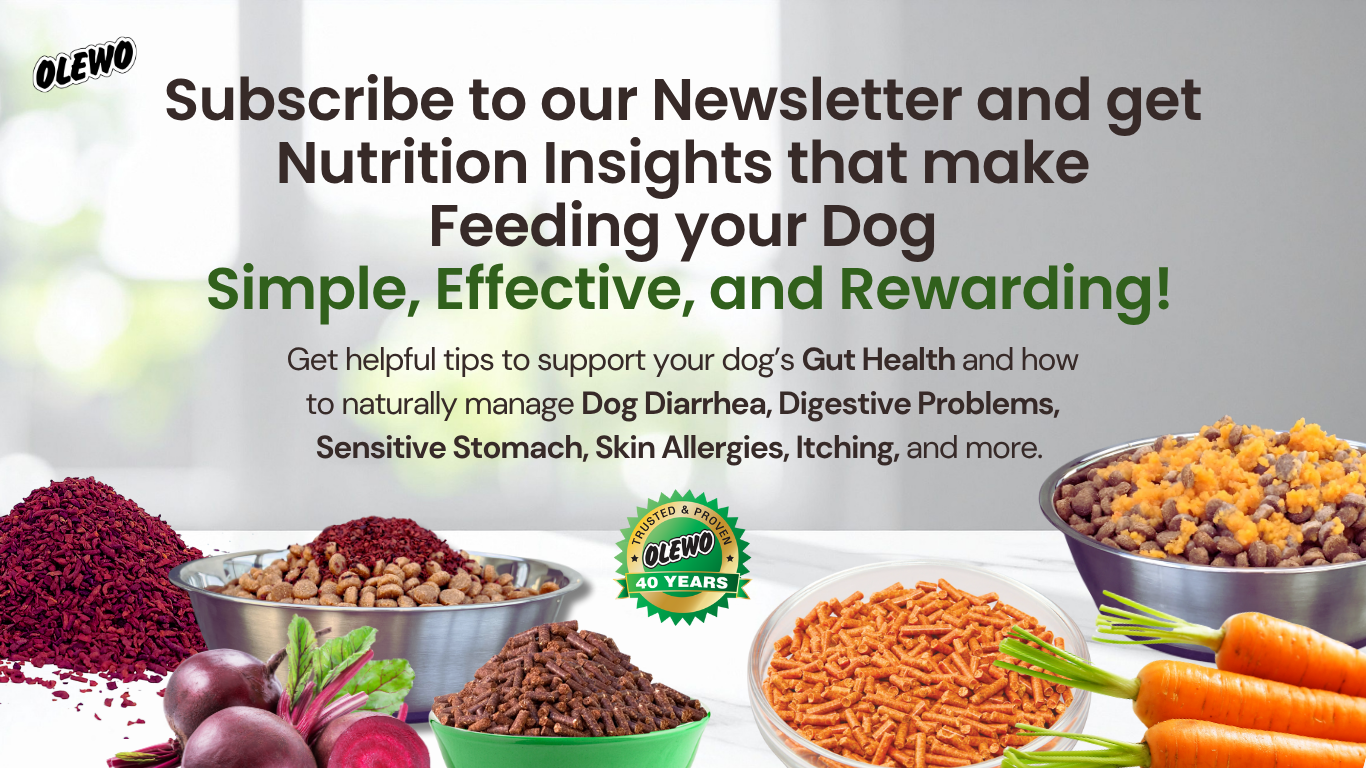

Leave a Reply